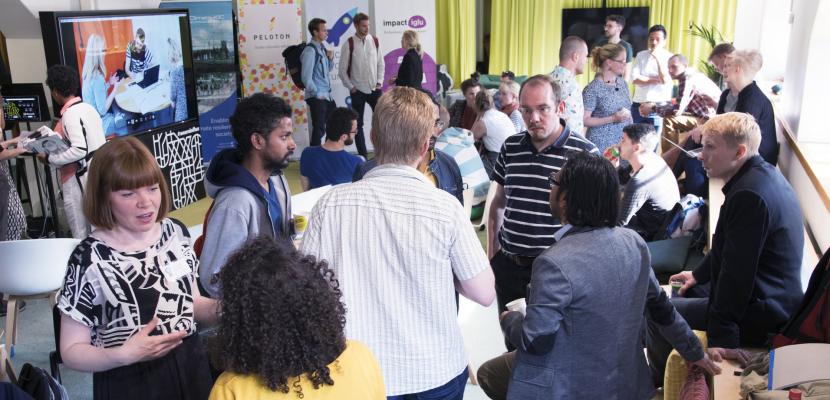Image

Peloton Club
Published on 04 June 2018

Finland
Etelä-Suomi
This is the good practice's implementation level. It can be national, regional or local.
About this good practice
Peloton Club enables start-ups to develop and test ideas in an accelerator program with experienced mentors, flexible urban testbeds and an ambitious ecosystem. For cities and corporations, it offers a possibility to cooperate with the start-ups and thus help cities and corporations to start a transition towards low-carbon solutions. Peloton Club is part of entrepreneurial and innovation activities of Demos Helsinki which also include for example projects with Estonia and other Baltic Sea countries aiming at creating new businesses within cleantech.
During the last 8 years, Peloton Club has created a unique entrepreneurial community, one that is open to a wider set of people. One that attracts wide range skills necessary for transforming cities/food/transportation/housing, including lifestyle-entrepreneurs, enthusiasts, designers, researchers, urban activists, professionals etc. Peloton has been supporting different industries and organisations in developing products, services and social innovations to help us make resource smart low-CO2 choices and to generate new profitable business opportunities for organisations.
Stakeholders involved in different Peloton projects are startups and companies, NGOs, end-users and citizens, municipalities and research institutions as well as ministries and public funding agencies.
During the last 8 years, Peloton Club has created a unique entrepreneurial community, one that is open to a wider set of people. One that attracts wide range skills necessary for transforming cities/food/transportation/housing, including lifestyle-entrepreneurs, enthusiasts, designers, researchers, urban activists, professionals etc. Peloton has been supporting different industries and organisations in developing products, services and social innovations to help us make resource smart low-CO2 choices and to generate new profitable business opportunities for organisations.
Stakeholders involved in different Peloton projects are startups and companies, NGOs, end-users and citizens, municipalities and research institutions as well as ministries and public funding agencies.
Resources needed
Approximatively 250 000 € per year. It is indicative only, and it can vary from location to location and depends on the local ecosystem actors and initial engagement level.
Evidence of success
Industry specific innovation camps & workshops have delivered significant impact like:
Rautakesko built an Energy expert service, developed a store concept and staff education programme in 2010
Lahden Ateria: 13% emission reduction & 100000€ of savings in one year by going through lunch recipes and reducing biowaste
ResQ (mobile app): Over 350000 meals ResQ’d from over 1750 restaurants since 2016, over 90000kg of food-waste prevented equal to CO₂ emissions from 8000000km driven, jobs creation
Rautakesko built an Energy expert service, developed a store concept and staff education programme in 2010
Lahden Ateria: 13% emission reduction & 100000€ of savings in one year by going through lunch recipes and reducing biowaste
ResQ (mobile app): Over 350000 meals ResQ’d from over 1750 restaurants since 2016, over 90000kg of food-waste prevented equal to CO₂ emissions from 8000000km driven, jobs creation
Potential for learning or transfer
Different regions can implement this approach. However, it is certain that due to different characteristics, the background and current situation of those regions (existing start-up infrastructure, activity level of the entrepreneurship scene, the type of approaches, events and initiatives already carried out and the key players in the current ecosystems, ...) play an important role of how and to what extent the implementation of this approach can be carried out.
For example, a collaboration project in Nairobi, Kenya is planned for 2018. The first steps will be to map the local startups/entrepreneurship scene, detect the needs of the entrepreneurs and community to plan relevant activities that engage and activate the local ecosystem and create new opportunities for entrepreneurs.
Peloton club is also part of Interreg SmartUp Accelerator which will help to enhance the Peloton approach and create bridges with the ecosystems of Baltic Sea Region countries.
For example, a collaboration project in Nairobi, Kenya is planned for 2018. The first steps will be to map the local startups/entrepreneurship scene, detect the needs of the entrepreneurs and community to plan relevant activities that engage and activate the local ecosystem and create new opportunities for entrepreneurs.
Peloton club is also part of Interreg SmartUp Accelerator which will help to enhance the Peloton approach and create bridges with the ecosystems of Baltic Sea Region countries.
Further information
Website
Good practice owner
You can contact the good practice owner below for more detailed information.
Organisation
Peloton

Finland
Etelä-Suomi
Contact
European project officer